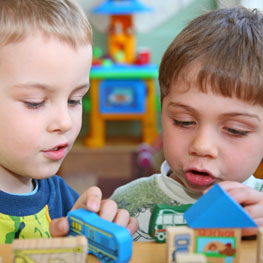
“Should I intervene, or let them work it out?” This is the question every parent contemplates when kids argue with each other. Two opinions prevail: “Yes, intervene! It’s worse when they are left to work it out themselves,” or “No, they will never learn to get along with others if an adult manages their squabbles.” In truth, most parents respond far less consistently during an argument, staying out of it until they just can’t take the fighting anymore, then swooping in to strong-arm the situation into resolution.
Neither extreme is perfect. Developmentally, kids are self-centered and so don’t yet have the ability to see an argument from perspective--each child can only see how she is being hurt, not how she is upsetting the other child. Therefore, some adult intervention is typically necessary to prevent a bitter stand-off.
On the other hand, too much adult interference robs kids of the chance to begin learning the important skills of conflict resolution. It is best to intervene by offering the necessary tools to help him resolve not just this one conflict, but all others in the future as well. There are three questions that every child (and adult) needs to learn to ask during each conflict in order to reach a resolution. When you help your child learn and, over time, master these three questions and their answers, disagreements will no longer be battles that require a referee:
1. “What did I do to contribute to this fight?”
It is always easiest to blame the other person. In reality, most arguments are the result of more than one factor, with contributions by both sides. It is hard to begin, but once a child is able to learn this type of self-reflection, it becomes easier to acknowledge responsibility and offer an apology. You can be a role model for your child by sharing times that you were able to admit to your part in arguments.
2. “How can I end this argument?”
Your job is to teach your child that in order to end a fight she will have to tolerate not getting exactly what she wants. Otherwise known as ‘compromise’, this is about becoming accustomed to not having exactly the resolution she wants. Remind your child that the relationship is worth more than being right every time. In fact, being able to tolerate being a little right and a little wrong is what keeps most relationships (especially marriages) moving forward healthily. The younger this lesson is learned, the better.
3. “What’s the best way to say I’m sorry?”
This is probably the hardest question for a child to ask, because he doesn't want to apologize! Your goal is to help him see that apologizing doesn't mean admitting defeat, but is a way of showing respect and acknowledging hurt feelings. In addition, an apology is given freely, not with an expectation of one in return.
It will take time, but as your child learns to master these skills, her ability to tolerate and learn from conflict will help her forge deeper, more meaningful relationships.
Dr. Susan Bartell is a nationally recognized family psychologist and author. You can learn more about her at www.drsusanbartell.comCalgary’s Child Magazine © 2024 Calgary’s Child